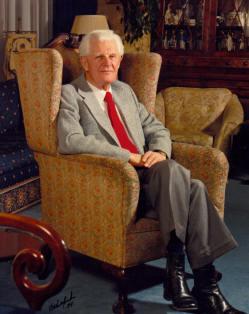
Funeral Sermon for the Hon. Dr. George Francis Gillman Stanley
The
Rev'd Kevin Stockall
St. Paul’s Anglican Church, Sackville, NB – September 16, 2002

From the Gospel According to St. Matthew, the 20th Chapter, the 26th Verse:
Whosoever will be great among you, let him be your minister; and whosoever will be chief among you, let him be your servant.
+ + +
Thirty years ago this Fall, in the Autumn 1972 edition of Acadiensis, Dr. Stanley concluded an article on “The Caraquet Riots of 1875” with the following words:
Too often, in Canadian history, compromise has come only after force, and justice after bloodshed. Are we incapable of learning any lesson from history?[1]
“Are we incapable of learning any lesson from history?”
I will not claim to be able to answer that very large and very troubling question; troubling not only as it pertains to Canadian society, but to all of human society. I will leave that to those better qualified than I. Dr. Stanley was very wise to pose the question then, in a time when both Canada and the world seemed engulfed in uncertainty and turmoil, and we would do well to consider it now.
I will, however, express the hope that we can learn some important lessons from the very long and very distinguished role that Dr. Stanley played, both within the field of Canadian history and Canadian society as a whole. In a fashion that historians very seldom ever do, he was able to move from being an analyst and interpreter of Canadian history to being a shaper of our collective identity. It was, and will always be, a very remarkable career.
In so many ways, Dr. Stanley’s career speaks eloquently of a much older time and much older ideas. It speaks of an older and, sadly, somewhat forgotten idea of what true public service means. Whether it was his many years of military service, his ground-breaking involvement in the field of Canadian History and Canadian Studies, his time spent serving on a wide range of boards and committees on the local, provincial, regional and national levels, his term as Lieutenant-Governor, or his much respected and very much loved role in the development and design of the Canadian flag, and even, I am very pleased to note, his service as Clerk of his Parish Vestry during his time at RMC; in all these roles, Dr. Stanley exhibited a persistent commitment to enriching and enhancing the common good by the exercise of his abundant gifts.
Whosoever will be great among you, let him be your minister; and whosoever will be chief among you, let him be your servant.
Jesus spoke these words as his earthly ministry was drawing to the horrific conclusion that he might have avoided but chose not to. He spoke to the disciples James and John of the revolutionary way in which the Kingdom of God, the Kingdom of Heaven, would turn the entire world upside down; so that ideas of honour and glory would be fulfilled not in the acquisition of power or might, but in the humble service of one to the other.
He spoke of the kind of glory which He Himself would have, not because He would adopt the ideals of the world, but because He would give of Himself, fully and entirely, on the Cross; giving of His life that He might give us life.
We might wish to define greatness in any number of ways; but true greatness lies not in the pursuit of our own ends, but in our willingness to give of ourselves; in our willingness to be servants of one another; in our desire, above all things, to seek the common good.
For some, that may seem an older idea; something of an echo from a far distant past. But for me, it is not just an echo of the past; it is the fanfare of the future.
We would do well to re-learn a lesson or two from Dr. Stanley’s life; a lesson about the nature of true greatness; a lesson about what public service might truly be; a lesson about the life of a servant, a public servant. In a time when respect for our national institutions seems to have eroded, it is a lesson that might bear fruitful discussion in both the corridors of power and the boardrooms of business.
It is the lesson that I want to take from the long and very distinguished life of Dr. George Francis Gillman Stanley – husband, father, grandfather, historian, author, soldier, teacher, public servant, child of God, and inheritor of the Kingdom of Heaven.
[1] George F.G. Stanley, “The Caraquet Riots of 1875,” in Atlantic Canada After Confederation (Fredericton: Acadiensis Press, 1988), p. 83; originally published in Acadiensis, Vol. II, No. 1 (Autumn 1972).